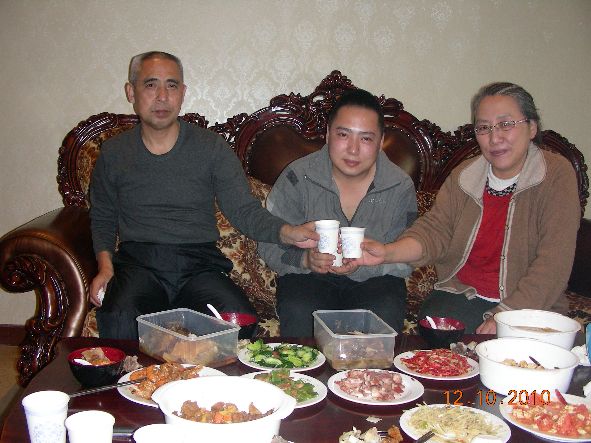| Radio Free Asia |
| March 7, 2012 |
 |
|
|
AFP Hada (l) shares a meal with son Uiles (c) and wife Xinna (r) in this photo dated Dec. 10, 2010. |
Ethnic Mongolian dissident Hada’s medical condition worsens in secret Chinese detention.
Prominent ethnic Inner Mongolian political prisoner Hada’s health has deteriorated following a serious inflammation of his blood vessels, adding to the numerous ailments he had contracted during his years of detention by Chinese authorities, a rights group said Wednesday.
As news of his latest health condition was released by the U.S.-based Southern Mongolian Human Rights Information Center (SMHRIC), Chinese authorities effectively confirmed Tuesday that Hada is in their custody after more than a year and a half of secret detention following 15 years of imprisonment on separatism charges.
"Hada is suffering from poor health and maltreatment in a secret prison near [regional capital] Hohhot," SMHRIC said.
Hada’s mother-in law, Hanshuulan, told SMHRIC that he was allowed a visit from his son, Uiles, on the eve of the Mongolian New Year in January.
"Uiles told us that Hada’s leg pain has worsened recently due to serious vasculitis, causing him difficulty walking," Hanshuuulan said. Vasculitis is inflammation of the blood vessels.
Hada had suffered a host of health problems while in detention, such as stomach ulcer, coronary heart disease and rheumarthritis, reports have said.
'Activities Limited'
A senior Inner Mongolia law official, meanwhile, in effect acknowledged, in the first public comments about the case in years, that the 57-year-old Hada is still under the custody of authorities.
"During this time, in accordance with the law, certain of his activities have been limited," said Tao Jian, the deputy Chinese Communist Party boss of Inner Mongolia's law and order committee.
"He was released in December 2010. But is he still serving out his four years of deprivation of political rights," he said, speaking on the sidelines of China’s annual parliamentary meeting in Beijing.
In 1996, Hada was sentenced to 15 years in jail for "splittism" and "espionage" and an additional four years of "deprivation of political rights," which, under China’s Criminal Law, includes restrictions on voting as well as freedom of speech and association.
"Hada is in a safe, healthy and well-guaranteed environment. That's all I have to say," Tao said, refusing to disclose Hada’s location.
Family harassed
Hada’s son Uiles is under tight police surveillance and virtual house arrest at his home in Hohhot, Inner Mongolia’s capital, following a detention on alleged drug charges last year, Hanshuulan said, while Hada’s wife also remains in detention.
"Uiles’ residence is under tight surveillance. Two video cameras installed in his house by the public security authorities monitor him around the clock. During the Mongolian New year, he obtained approval to visit us … but four public security personnel escorted him, and took him back to Hohhot after a few hours."
In the run-up to Hada’s release in 2010, authorities had shut down the family’s Mongolian Studies Bookstore detained both Uiles and Hada’s wife, Xinna.
Xinna was accused of "illegally running a business" for selling Mongolian books and music albums, while Uiles was accused of drug-dealing.
Xinna is currently being held in the Inner Mongolia No.1 Detention Center, and has refused to admit her husband is a criminal.
Another former activist in the 1980s Mongolian student movement, Govruud Huuchinhuu, was subjected to repeated harassment and beatings by authorities while in detention in Inner Mongolia last year.
Mongols are a recognized ethnic minority in China and number around six million according to government statistics.
Hada had long sought greater autonomy for ethnic minority Mongolians, some six million of whom live in Inner Mongolia Autonomous Region in northern China.
His continued detention comes after large-scale protests by herders and students across the region last summer, triggered by the killing of a herdsman in standoffs with mining company staff.
Official documents described the protests by thousands of ethnic Mongolians in the region's major cities as the work of "external hostile forces."
Reported by Rachel Vandenbrink.
Copyright © 1998-2011 Radio Free Asia. All rights reserved.







